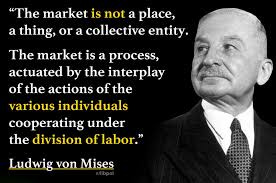Introduction
Human Action, the magnum opus of Ludwig von Mises, is a comprehensive treatise on praxeology, the science of human action. This book is central to understanding Mises' contributions to economic thought and remains a foundational text for Austrian economics. Through Human Action, Mises lays out a detailed framework for understanding economics as a discipline rooted in the purposeful actions of individuals rather than abstract models detached from human behavior.
Key Concepts in Human Action
At the heart of Human Action is the concept of praxeology, the study of human action based on the assumption that humans engage in purposeful behavior. Mises argues that economics is a branch of this broader science, emphasizing that economic activities are driven by individual choices made to achieve specific ends.
One of the most critical aspects Mises emphasizes is the importance of subjective value. In contrast to the labor theory of value, which dominated classical economics, Mises asserts that value is not inherent in objects but is rather a reflection of individual preferences. This subjectivist approach underpins his theory of price formation and market operations, where prices emerge from the interplay of supply and demand as individuals make choices based on their subjective valuations.
Mises also delves into the concept of economic calculation, which he considers the cornerstone of a functioning market economy. Economic calculation, enabled by money prices, allows individuals and businesses to allocate resources efficiently. He warns that in the absence of a price mechanism, such as in a socialist economy, economic calculation becomes impossible, leading to misallocation of resources and economic chaos .
Mises' Main Messages and Departure from Conventional Economics
Mises challenges many of the core assumptions of mainstream economics. His rejection of empirical and statistical methods in economics is a significant departure from conventional economic thinking. Mises argues that economics is not an empirical science like physics but a deductive science based on a priori reasoning. This approach leads him to dismiss the reliance on historical data for economic predictions, as human action is too complex and variable to be captured by statistical models.
Another key difference is Mises' staunch defense of the market economy against socialism and interventionism. While conventional economics often explores mixed economies or government interventions as viable options, Mises firmly argues that any deviation from pure capitalism hampers economic calculation and leads to inefficiencies. He criticizes the "middle-of-the-road" approach as a slippery slope toward socialism, asserting that only a free market can ensure rational economic decisions and societal prosperity .
Mises also critiques the idea that government intervention can achieve "social justice" or better economic outcomes. He maintains that such efforts are not only doomed to fail but also lead to unintended consequences that harm the very people they are intended to help. According to Mises, the market, through voluntary exchanges and the price mechanism, is the best means of achieving individual and collective well-being .
Conclusion
Human Action is more than a textbook on economics; it is a profound exploration of human behavior and its implications for society. Mises' work challenges readers to reconsider the foundations of economic thought and to recognize the crucial role of individual action in shaping economic outcomes. By grounding economics in the realities of human choice and rejecting the abstractions of conventional models, Mises provides a powerful argument for the market economy and a robust critique of socialism and interventionism.
In a world where debates over economic systems continue to rage, Human Action remains as relevant as ever. It serves as a reminder that at the core of economics lies human action, with all its complexities and unpredictability. Understanding this principle is essential not just for economists, but for anyone interested in the forces that shape our world. Needless to say, I think the Austrian economists would have all been Bitcoiners:
Not financial or legal advice, for entertainment only, do your own homework. I hope you find this post useful as you chart your personal financial course and Build a Bitcoin Fortress in 2024.
Thanks for following my work. Always remember: freedom, health and positivity!
Please also check out my Bitcoin Fortress Podcast on all your favorite streaming platforms. I do a weekly Top Bitcoin News update every week on Sunday, focused on current items of interest to the Bitcoin community. Please check it out if you haven’t already. Also now on Fountain, where you can earn Bitcoin just for listening to your favorite podcasts.
Follow me on Nostr:
npub122fpu8lwu2eu2zfmrymcfed9tfgeray5quj78jm6zavj78phnqdsu3v4h5
If you’re looking for more great Bitcoin signal, check out friend of the show Pleb Underground here.
Lightning tips appreciated here.







Difficult book to read but well worth the journey